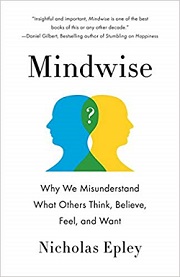What We're Reading Now
Retraining Your Sixth Sense
11 June 2019
Eden read Mindwise: Why We Misunderstand What Others Think, Believe, Feel, and Want by Nicholas Epley and thought about how well she understands the minds of others.
Tags: communication, eden read, empathy
Have you ever wished that you were better at sensing others’ thoughts and feelings from their words and actions? That’s the capability I wanted to develop when I started reading Mindwise: Why We Misunderstand What Others Think, Believe, Feel, and Want by Nicholas Epley. Sadly, one of the first things I learned from Epley is that our ability to guess others’ emotions using our “sixth sense” is pretty much a lost cause. Epley explains some of the reason for our difficulty using an analogy called “the neck and lens.”
If you and I are looking at a painting, I can stand right next to you and tilt my head in the same way and try to look at the painting from your point of view. But, if we are wearing different lenses over our eyes, then no matter how closely I stand or how perfectly my head is tilted, we won’t be seeing the exact same thing. All of us wear different lenses (called schemas in Psychology) that are made up of our unique life experiences. “You cannot simply try harder to view the world through the eyes of another and hope to do so more accurately, because the lens that biases your perceptions is often invisible to you.” Fortunately, there’s a fairly simple (albeit harder-to-practice) remedy.

Whether our inability to understand others is rooted in a “neck problem,” a “lens problem,” or a combination of the two, Epley suggests that the real problem is that we simply fail to ask questions. All too often, and especially when we know someone well, we choose to rely on our unreliable sixth sense rather than engage in conversation. “Others’ minds will never be an open book,” writes Epley. “The secret to understanding each other better seems to come not through an increased ability to read body language or improved perspective taking but, rather, through the hard relational work of putting people in a position where they can tell you their minds openly and honestly.”
This reminded me that empathy should go beyond the practice of imagining what it’s like to be in another person’s shoes. It’s easy for me to leave a tense interaction and say to myself, “I know this person is mad at me.” It’s hard for me to pick up the phone, ask that person if they are willing to talk about our conversation, and remember that I should be listening to understand rather than listening to respond. If you’ve been letting empathy be an exercise of the imagination rather than working to create a psychologically safe place for others to speak freely, I recommend you start asking more questions. You might learn that your intuition was right, but you might learn something new entirely.







Comments
Our Comment Policy:
Our blog posts are only half of the conversation. What our readers have to say is equally important to us, and we're grateful for all the comments that continue the dialog.
To ensure that the discussion here is as useful as possible to all of our readers, please be respectful of our contributors and refrain from harassing, threatening and/or vulgar language. We reserve the right to screen and remove any comments from the site. If you have a question about a comment or want to discuss our policy, please contact us. We'll talk it over.
There are no comments for this entry yet.